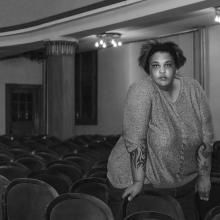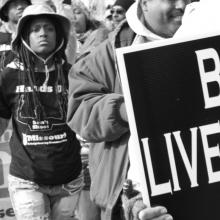Opinion
We’re made in the image
The Message expresses,
The Good News attests
That we’re formed out of sod,
That we’re made every one
In the recollections of many evangelicals, America was then a tranquil, moral land deeply rooted in a specific set of traditional Christian values: the shining city on the hill, an idyllic small-town nation dominated by a white male leadership group.
There was nothing for me to do in that moment but recognize that her humanity and my humanity are made to see each other, feel each other, embrace each other. There were no dividing lines or political views or religious dogmas to get in the way. There were simply two families grieving with one another that the world is not always as it should be.

Image via Forsaken Fotos/Flickr.com
The most religious states — a comparison based on questions like church attendance, identity, and prayer frequency — more often than not coincide with the poorest states, the states with lowest life expectancy, and the states where it is most dangerous to be LGBTQ and/or a person of color.

Image via Bartleby/Flickr.
As writer, activist and Holocaust survivor Elie Wiesel noted, “Hope is like peace. It is not a gift from God. It is a gift only we can give one another.”
Early this month, the Mennonite Church USA succeeded overwhelmingly in passing a resolution in support of peace and justice in Israel/Palestine — and it was no easy feat. As an eyewitness and active participant to the activities leading up to this landslide vote, I can tell you the road there was tough, agonizing, and expensive.
Self-care is important. If we lose our enthusiasm and start going through the motions, we’re not much good to anyone — including ourselves. Our love is diminished when we lose our sense of connectedness to the source of love, awe, and wonder. Our lives are diminished, too.
Art and Christianity give our lives import and meaning, irrespective of power, race, gender or class. Jesus did this when he overturned the Greek and Roman way of viewing the world, in which one’s social status was everything, and introduced the notion of the equal worth and dignity of all human beings. “Here there is no Gentile or Jew, circumcised or uncircumcised, barbarian, Scythian, slave or free, but Christ is all, and is in all (Col. 3:11),” wrote Paul. All people made in the image and likeness of God, “lovely in limbs."
As people of faith who believe that concern for the health of our fellow children of God is mandated by our Savior Jesus (“I was sick and you took care of me” – Matthew 25:36) this is a time to give thanks to God. We are grateful that wisdom and compassion have, at least temporarily, triumphed over cynicism and greed.
We live in a world full of extremists. It is not just in American society that the battle between extreme beliefs on either end of the spectrum is happening constantly in our political, social, and religious circles. Violence, hate crimes, and acts of oppression erupt all over the world, and through the news and social media, we are witnesses to the distress calls of the people who are caught in the middle of these battles

Image via Eva Blue/ Flickr
Gay is a true prophetic voice. She laments her life, her trauma, and her weight. She doesn’t promise victory but speaks to the pain that so many people feel: victims and survivors of sexual violence, bisexual people, fat people, and lonely people.

Image via Rena Schild/ Shutterstock
What we’ve learned three years after Eric Garner’s death is that we can’t give up on God’s mandate for justice, incarnated in the gospel’s good news. If we trust and believe that selfish agendas of special interests will not prevail, we are compelled instead to believe that love will conquer hate.
As Wendell Berry reminds us, “There are no unsacred places; there are only sacred places and desecrated places.” The earth is the Lord’s and everything in it. Jacob’s story reminds us that it is not God who changes, suddenly appearing when previously absent, but it is Jacob who wakes up to a new awareness of where God is.
Help them understand they have a voice.
Elizabeth Brandt, a mom and a participant of the play-in, takes her young daughters to her senators’ office. She believes she believes this will lay a foundation for her daughter to speak up throughout her life.
“She may not have the most articulate things to say — last year when she was three she asked them not to throw trash in the ocean which our senators don’t do — but she’s learning that she has a voice in this process and that’s about the most important thing,” said Brandt.
A Christianity that would vote for its own defense over the defense of those coming from war-torn countries, or the most in need among us, does not abide by the commands of its true champion — Jesus Christ.
This week Rev. Teresa Hord Owens was elected General Minister and President of the Christian Church (Disciples of Christ), becoming the first African-American woman installed as head of a denomination (although there have been moderators like Belva Brown Jordan, leading pastors, and bishops of other denominations over the decades).
Much can and should be made of the firsts represented by her election.
We will need both lament and hope to cope with the existential crisis of climate change. Go read New York Magazine writer David Wallace-Well’s piece for your dose of lament. Then read the stories below for a briefing on where to look for hope.
But really, the best performance in the film belongs to Nanjiani —no surprise, since it’s partly his own story. The affection he feels for his parents makes him afraid to upset them, but to really come into his own as a person, and as a comedian, he has to be honest with them about what he wants for his life.
As Congress returns and as leaders of the Senate and House continue their desperate search for ways to pass their health and budget proposals, I have one simple question for those whose votes will decide these matters: Is this really why you came to Washington, to take health care from the sick and food from the hungry?
America as a largely Christian nation is under scrutiny for its values and integrity. It’s an interesting time to be a person committed to faith in action. How does Christian faith inspire a response to these chaotic times?















